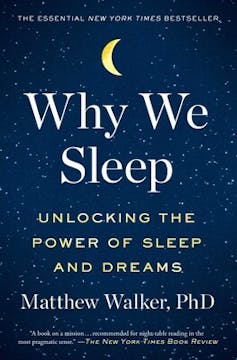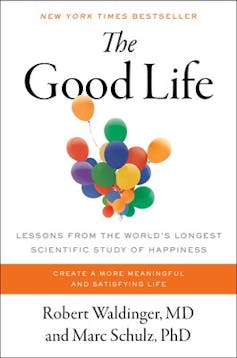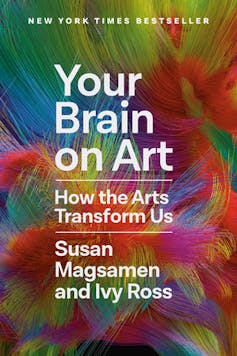Lead image by saramkhani / Shutterstock
By Joanna Pozzulo
This article is republished from The Conversation under a Creative Commons licence. All photos provided by The Conversation from various sources.
Joanna Pozzulo is a Chancellor’s Professor and professor of psychology at Carleton University.
In a survey examining views on health and well-being, almost all Canadians responding reported wanting to improve their personal well-being.
Perhaps there is no better time for a personal wellness reboot than during the summer months. Picking up a book with information aimed at improving your well-being may be the boost you need to kickstart your wellness journey.
Books have the ability to educate and improve the lives of their readers. Approximately half of Canadians read or listen to a book once a week, while over 30 per cent report reading daily.
This is good news, as reading has been associated with several health benefits including stress reduction, slowing cognitive decline, aiding well-being and improving sleep quality.
Self-help reading as part of a group
Being part of a community supports well-being, decreases social isolation and increases connectedness. Many may find reading is a solitary activity, but it is also possible to read as part of a community.
Book clubs may facilitate the benefits of reading and community. A variety of formats exist for book clubs including in-person meetings, electronic discussion platforms or a combination of the two.
In the “self-help” category, over 15,000 books are published yearly. Not all self-help books are supported by research, and sifting through so many books can be challenging. So what should you read?
Evidence-based books on well-being
For anyone wanting a curated list of evidence-based books on different dimensions of well-being, I created the Reading for Well-being Community Book Club, housed at the Mental Health and Well-Being Research and Training Hub at Carleton University.
The book club, open to readers in or beyond the Carleton University community, uses a digital platform to post book selections and reviews, where members can communicate. Book club members receive a monthly newsletter alerting them to the new book selection, review, and some questions about the book for the electronic discussion board.
Each month, I select and review a book grounded in science that is directed at improving well-being, selected as Professor Pozzulo’s Picks. Here are four evidence-based books to help with your personal well-being summer reboot:
Why We Sleep: Unlocking the Power of Sleep and Dreams by Matthew Walker (2017, published by Simon & Schuster).

If you want to better understand the patterns in sleeping, their function and their role for well-being, Walker, a professor of neuroscience and psychology at the University of California, Berkeley, provides a description of the work in this area.
If you are looking for a list of strategies for improved sleep, Walker provides those too in the book’s appendix. Walker made me care about sleep and more importantly, the need to sleep for improved well-being.
The Good Life: Lessons from the World’s Longest Scientific Study of Happiness by Robert Waldinger and Marc Schulz (2023, published by Simon & Schuster).

(Simon & Schuster)
For over 80 years (and counting) participants and their families were given comprehensive assessments across the duration of their lives. Waldinger, clinical professor of psychiatry at Harvard Medical School, and Schulz, professor of psychology at Bryn Mawr College, conclude relationships are fundamental to well-being and improving your relationships is possible at any stage in life.
Not only do the authors allow you to examine the lives some of their participants have lived, they also provide practical exercises to help you improve the quantity and quality of your relationships.
Your Brain on Art: How the Arts Transform Us by Susan Magsamen and Ivy Ross (2023, published by Penguin Random House).

(Penguin Random House)
The authors explore the field of neuroaesthetics, the scientific investigation of how the arts can alter the brain, body and behaviour. They note that doctors are now writing social prescriptions for things like a trip to the museum or a walk in the park.
This book offered a fascinating examination of how the arts can be used to positively influence well-being, improve overall health and allow communities to thrive. Authors offer several suggestions on how you can incorporate the arts into your daily life for improved well-being. Magsamen is the founder and executive director of the International Arts + Mind Lab at Johns Hopkins University School of Medicine. Ivy Ross is vice-president of hardware design at Google and earlier worked as a jewelry designer.
The Anxious Generation: How the Great Rewiring of Childhood is Causing an Epidemic of Mental Illness by Jonathan Haidt (2024, published by Penguin Random House).
This is an important book examining the connection between the rise of social media use and status of mental health. This book is not only for parents but is for anyone wanting to understand the development of the interplay of these issues.
Haidt offers several suggestions that can be implemented almost immediately to
reduce the negative impact of social media on the developing brain. Haidt is a social psychologist and professor of ethical leadership at New York University’s Stern School of Business.
To sign up for the book club, you can visit here.
Happy reading!
![]()
Friday, June 21, 2024 in The Conversation
Share: Twitter, Facebook



